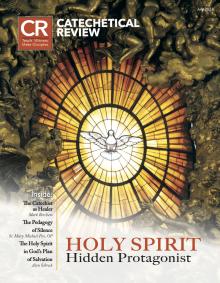Though I tell people that I’m a theologian (which is technically true), I’m really a Church historian. I was attracted to the study of Church history starting in high school because I was interested in how people, stories, and examples from our history should inform our teaching, evangelization, interpretation, and internal Church decision-making now. The major question for the catechist is how properly to use the past in our present efforts. In the midst of the National Eucharistic Revival, this question is very relevant, as there are Eucharistic devotions, teachings, and movements that most people have never encountered and that, at first glance, might seem strange or shocking. I would like to present a guiding principle for using history to spur Eucharistic belief and devotion, followed by three examples from history that show this principle in action and that I believe can bear fruit now.
Historical Moments
The most common mistake we make when we discover something interesting or edifying from history is to say, “look what they did back then; we should do it now.” This approach, which comes from the excitement of discovering something of value, neglects the importance of cultural and social context, as well as theological development. Instead of doing that, let’s present historical episodes, ideas, and developments as what they are: unique moments when the Church, or a segment of the Church, realized something it hadn’t realized before or reacted to a new challenge. When we see a teaching or practice arising in its own context, we can learn more and be inspired by its original importance and meaning—like the background of a painting allowing you to see the outline and the details of the foreground.
There are also examples from history of things we have forgotten or have allowed to lie dormant. While it’s true that some practices or emphases should be allowed to fade with the social and cultural situations that originally housed them, others speak to ongoing realities. It takes wisdom, discernment, prayer, and patience in this area to determine the difference between the two.
Eucharistic Controversies
Eucharistic belief develops. This does not mean that we believe “new” things; rather, it means that our understanding of the full truth, which is inexhaustible in this life and always remains partially concealed, continues to grow like a tree from an acorn or an adult from an embryo. There have been moments in history when the Church first “saw” something in a new or different way. In catechesis, these moments can draw our attention to the how and why of orthodoxy and orthopraxy. One such moment that I like to use in catechesis is the argument over the Eucharist that took place between two ninth-century monks named Ratramnus and Paschasius. The question they debated was whether Christ’s body, seated at the right hand of the Father, was identical to the Body that we receive in the Eucharist. In other words, are they exactly the same body with the same properties?
The rest of this online article is available for current Guild members.
[1] John L. Allen, Jr., “Top Ten Practicing Catholic Countries: It’s an African Story,” Crux, January 31, 2023, https://cruxnow.com/pope-in-south-sudan-congo/2023/01/top-ten-practicing... see further Mark M. Grey, “Where Is Mass Attendance Highest and Lowest?,” Nineteen Sixty-Four (research blog for the Center for Applied Research in the Apostolate at Georgetown University), http://nineteensixty-four.blogspot.com/2023/01/where-is-mass-attendance-....
This article originally appeared on pages 26-27 of the print edition.
This article is from The Catechetical Review (Online Edition ISSN 2379-6324) and may be copied for catechetical purposes only. It may not be reprinted in another published work without the permission of The Catechetical Review by contacting [email protected]

















